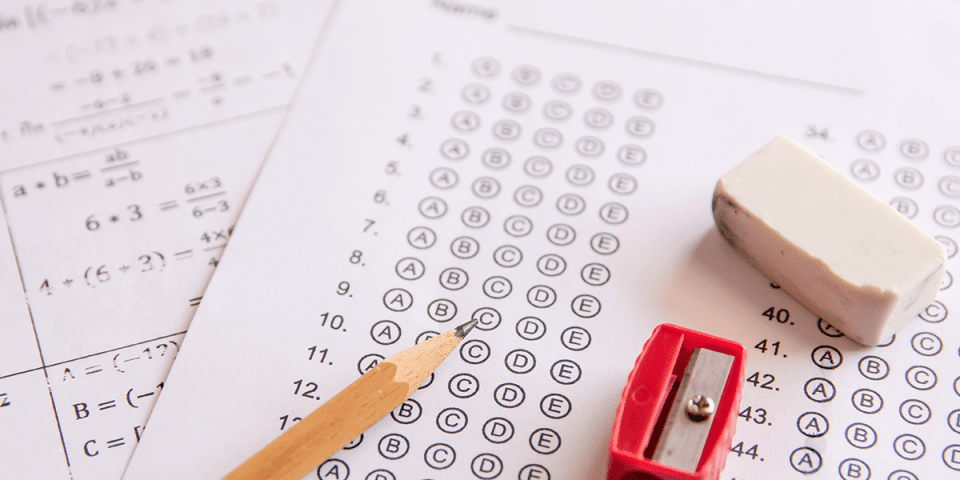
Most people have had the experience of feeling nervous before they take an important test, and some people have experienced an intense fear or worry known as test anxiety.
Test anxiety is a type of performance anxiety. In situations where the pressure is on and a good performance counts, people may become so anxious that they are actually unable to do their best.
All of this stress is the body’s “fight or flight” response. Your body releases adrenaline, and the energy that would be used to focus on the test gets diverted into being on high alert.
Performance anxiety isn’t just for test taking. Some other examples of performance anxiety are:
- A professional freezes up and forgets the information they were going to share during a work presentation.
- A high school basketball player becomes very anxious before a big game and is so overwhelmed by this stress that they start missing even easy shots.
- A musician becomes extremely nervous before a recital. During the performance, they mess up on several key passages and flubs her solo.
While they all have the skills and knowledge they need to do very well in these situations, their excessive anxiety impairs their performance.
The severity of test anxiety can vary considerably from one person to another. Some people might feel like they have "butterflies" in their stomach and while others might find it difficult to concentrate on the exam.
A little bit of nervousness can actually be helpful, making you feel mentally alert and ready to tackle the challenges presented in an exam. Increased stress levels can help you do better on exams, but only up to a certain point.
Once these stress levels cross that line, the excessive anxiety can interfere with test performance. Excessive stress can make it difficult to concentrate and cause you to struggle to recall things that you’ve studied. It may even feel as though all the information you spent some much time reviewing is suddenly inaccessible in your mind.
Symptoms of test anxiety can be present in your thoughts, emotions, and in your body. Physical symptoms of test anxiety include sweating, shaking, a rapid heartbeat, dry mouth, fainting, and nausea. Sometimes these symptoms might feel like a case of "butterflies" in the stomach, and other times they may feel much more intense.
Cognitive and behavioral symptoms of test anxiety can include going out of your way to avoid situations that involve testing, memory problems, difficulty concentrating, and negative self-talk. Emotional symptoms of test anxiety can include depression, low self-esteem, anger, and a feeling of hopelessness.
A little test anxiety can be a good thing. Too much of it is another story. If sitting for a test gets you so stressed out that your mind goes blank and causes you to miss answers that you know, then your level of test anxiety probably needs some attention. Use the strategies below to ease your stress and tackle test anxiety.
Ask for Help
Never hesitate to ask for help in managing test anxiety. Teachers, professors, and test consultants can provide valuable information to help you feel prepared. If you have a learning disability, don’t hesitate to ask for the appropriate test accommodations. Counselors and other mental health professionals can help you challenge negative thinking as you prepare and for the day of the test. The less isolated you feel in this challenge, the more likely you are to overcome it.
Be prepared
Good study habits and skills are so important, and no amount of cramming or studying the night before a test can take the place of the deeper level of learning that happens over time with good study skills.
Many students find that their test anxiety eases when they start to study better. The more you know the material, the more confident you'll feel.
Watch what you're thinking
Watch out for any negative messages you might be sending yourself about the test. They can contribute to your anxiety. If you find that you’re constantly telling yourself that you don’t do well on tests, shift your inner dialogue. Begin telling yourself that you are better prepared this time, so you can feel more confident about this test.
Accept mistakes
Keep mistakes in perspective. Mistakes are how we learn to do better. We all fell down many times learning to walk, and the same principle is true for learning anything new. Mistakes are going to happen, and you don’t need to spend the energy on beating yourself up for them.
Take care of yourself
Practicing breathing exercises regularly helps your body see these exercises as a signal to relax. Use the link below to get the Guide to Abdominal Breathing for Stress Relief. Deep breathing is like the off switch for the fight or flight response, and the more you use it, the more your body learns to respond by relaxing.
Use Hypnosis!
Whether you use self-hypnosis techniques or work with a professional hypnotist, you can learn to reprogram your inner dialogue, improve your concentration, and lower your stress in just a few sessions. Hypnosis is like the owner’s manual for your mind, allowing you to easily and permanently program in changes to habits and behaviors.∎
Free “15 Minute De-Stress” hypnosis audio
https://zfrmz.com/AHwC5ECIYDLXnfj3NU4G
Free “Abdominal Breathing for Anxiety and Stress Relief” tool
https://zfrmz.com/KuWL6RM1fRmcpiQlasJi
Karen Gray is a Certified Hypnotist, Registered Nurse, and Director of Green Mountain Hypnosis. For more information on how you can use hypnosis to change your life, schedule your free Strategy Call at https://karengray3.zohobookings.com/#/customer/3976471000000026006